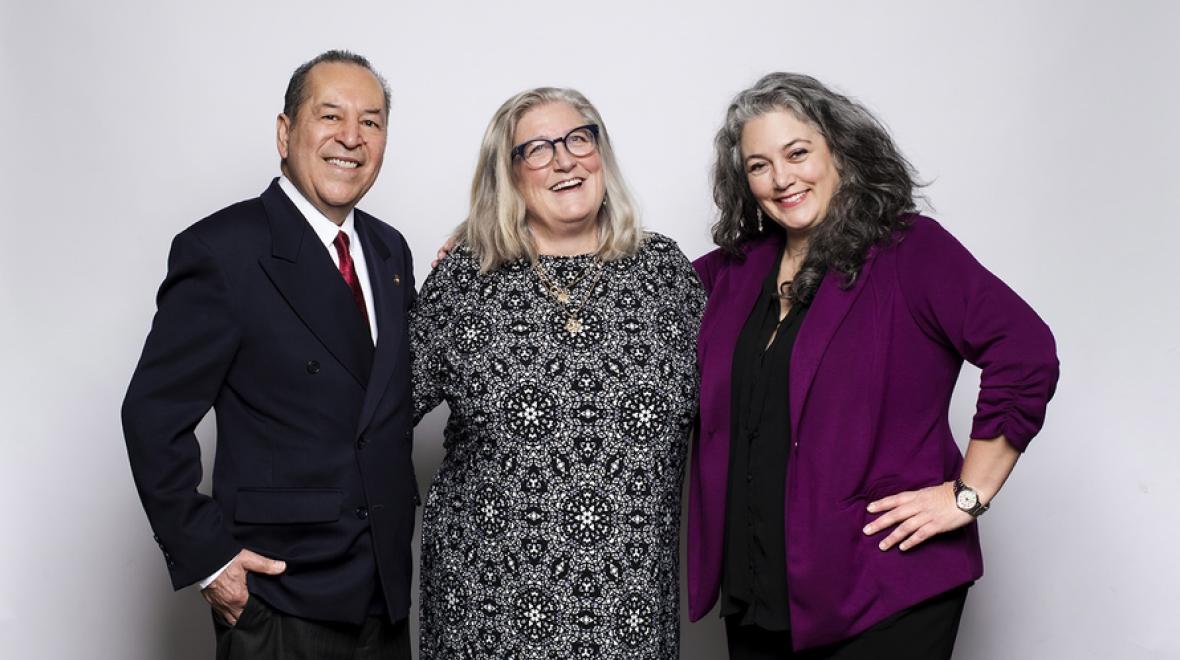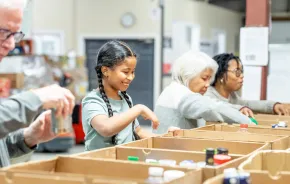ParentMap’s 2023 Superheroes for Washington Kids and Families

Photo:
Left to right: Carlos Jiménez, Putter Bert and Angie Hinojos. Photo credit: Will Austin
The Community Organizers
Putter Bert, president and CEO of Bellevue’s beloved KidsQuest Children’s Museum and a 2020 ParentMap Superhero, bestows the superhero title upon two people who are helping to create a quilt of community on the Eastside: Angie Hinojos and Carlos Jiménez, cofounders of Redmond-based Centro Cultural Mexicano.
“I nominated them because I think what they do for the community and where and how they show up is remarkable,” says Bert. “During the pandemic, it was clear to me that they opened their arms wider to help people in all communities. They hosted so many vaccine clinics and did everything they could for people, from getting rental assistance to people to hosting toy drives during the holidays.”
Although Bert, Hinojos and Jiménez collaborated as part of their participation in the Eastside Cultural Coalition prior to March 2020, they began to get to know and rely on each other through the coalition meetings held virtually during the pandemic. “At the meetings, we helped each other mentally, physically and professionally, but what we really wanted to figure out is how we can make a stronger Eastside. Every time I walk into a community room now, Angie and Carlos are right there. I haven’t known them very long, and I want to be in their space,” says Bert.
Hinojos and Jiménez created a physical space when they opened the Centro Cultural Mexicano in November 2018. In addition to being the cofounder and executive director of Centro Cultural Mexicano, Hinojos is a public artist and a trustee for Cascadia College. She also serves as chair of the Washington State Commission on Hispanic Affairs. “Our nonprofit organization serves our Latino communities with programs and services in Spanish and English. Our goal is empowerment of our communities. We look at that in a lot of different ways: through education supports, providing assistance for small businesses to help them gain financial stability, creating programs to help build intergenerational wealth and expanding leadership opportunities in our communities so we have representation at all levels of society,” says Hinojos.
Hinojos and Jiménez founded the organization in East King County because they saw a need for their community to have a safe and inclusive space where people could not only access services and programs, but also forge community connection through art and culture. The cofounders agree that art and culture programming is the best tool for connection because it allows people to open themselves up to conversation and discovery. “That’s where we can get to the heart and soul of who we are as a people, and then we can engage deeply with them,” says Jiménez, who has many years of experience in founding nonprofits, serving on boards and commissions, and previously serving as an elected official.
Centro Cultural Mexicano is a direct service organization: The programs and resources it develops stem directly from the needs of the community it serves. During the pandemic, Hinojos and Jiménez used a grant they received to pay the center’s rent as seed funding to begin a rental assistance program, giving out $25,000 in $500 increments. The organization has distributed more than $27 million in rental assistance since the pandemic began.
These days, a typical week at Centro Cultural Mexicano includes a variety of activities. During one week in March, for example, the center hosted a workshop for 40 small-business owners; worked with youths to develop leadership skills; met with community members who stopped in for free tax preparation help; there were two meetups for art groups; and the team fielded a variety of community needs, ranging from immigration topics to housing concerns.
“On Valentine’s Day, we had an art opening with live music and food. At events like this, we also introduce people to our services,” says Hinojos. “While we are dancing and eating, we are also sharing. We want people to get to know all about our different programs and services in a comfortable way that also uplifts our community and culture. We can offer assistance to people with respect and love.”
Jiménez adds that it is most important to them that they listen to their community with understanding and compassion: “Coming together to enjoy music, food and arts builds connection and trust within the community.”
Centro Cultural Mexicano also focuses on youth engagement. “We have 10 paid youth interns and a youth advisory board. We have a creative technology makerspace and a youth engagement center. We want our youth to help us create these spaces with us,” says Hinojos.
Who is your personal hero?
Hinojos: My parents, who always encouraged my brothers and me to question everything and come to our own conclusions. For our Latino community, there are so many inequities that exist in our systems and institutions. If we don’t question everything and come up with solutions, then we are not going to be able to change those inequities.
Jiménez: My grandmother. She raised me since I was 3 months old. She was a really strong woman, a single mother of six. She guided every one of my uncles to be a good individual. She taught me that no question is a bad question, don’t look down on anybody, help lift others up, and always have your head up and be proud of who you are. Also, never forget where you came from.
What do you wish people understood about your work?
Jiménez: I really don’t expect people to understand the work that we do. We carry the mission upon ourselves. We are the ones who need to understand every single person who walks through our doors, and we have a responsibility to create a safe place where people can interact and learn.
Hinojos: I want people to understand that our work takes trust, and this trust is sacred and a deep expression of human connection. We’re trying to build a bigger vision for our communities.
What daily habit or small routine is most important to you?
Hinojos: We always take a minute in the morning to talk about the bigger issues that are facing us. We meet over coffee early, before the doors are open. That’s when we really let our thinking expand. [This routine] gives context to the smaller tasks that we do every day.
Jiménez: We share the vision for the day. We always know the day is not long enough — 12 hours or 16 hours — but we always try to accomplish what we set out to do for that day.
How do you measure progress in your work?
Hinojos: The greatest measure is when we have community members or people who run small businesses come back and we see them thriving. They may stop coming because they got what they needed. And then a year later, they come back and they’re thriving. That’s a great feeling. It’s an ecosystem: We try to build community bonds that become our collective strength.
Jiménez: Some of them come by and give a sincere thank-you, and that gives you the strength to get through the day.
What’s your best advice for today’s parents?
Hinojos: Above all, love your kids, because that gives them confidence. When a child feels love from a parent, it becomes part of how that child views themselves.
Jiménez: Being a parent is one of the most beautiful things that can happen to a human. This generation is going through a lot of changes, hurdles and hard times. Just listen to your children and pay attention.
If you could dine with anyone, living or dead, whom would that be and why?
Hinojos: My dad. Life is long but it feels short sometimes, and we never have enough time with those we love.
Jiménez: My grandmother, so I could have the longest conversation with her.
What’s your favorite read of the last year?
Hinojos: My son is in college, and he just read “Knulp” by Hermann Hesse. I just love this book, and we had the most beautiful conversation about it. When I read this book for the first time, I had a similar conversation with my dad, and it reminded me that we pass onto others what we carry with us.
Jiménez: I have been thinking lately about a book I read by Sor Juana Inés de la Cruz. She is a Mexican hero who wrote about the equality of women and how strong women can be when they raise their voices.
An update from 2020 Superhero Putter BertParentMap honored Putter Bert, president and CEO of KidsQuest Children’s Museum, as a Superhero right as the coronavirus pandemic made its conspicuous arrival in our backyard. We caught up with her to hear how the work of the museum has evolved as a result. How has the museum pivoted to support the community these past few years? Like everyone else, we started with online programming. We quickly realized people needed to touch stuff. So, we created activity boxes that we both sold and gave away. Then we packaged up a lot of our exhibits, like the fruits and vegetables from our market exhibit, to loan to families and child-care providers so people could play market. What do you credit for the success of your efforts to deliver programs and connection during the pandemic? My incredible team — they are the most caring people I know — did what we needed to do for the community. What are you focusing on now in your work at the museum? Now, we have a lot of money to raise to pay for all of the things we did during the pandemic. We are stronger, smarter — and smaller. I don’t know what is around the next corner, but I am working hard to prepare the museum for what comes next. Read more about Bert’s leadership at here. |
Up next: The Veterans’ Advocates









